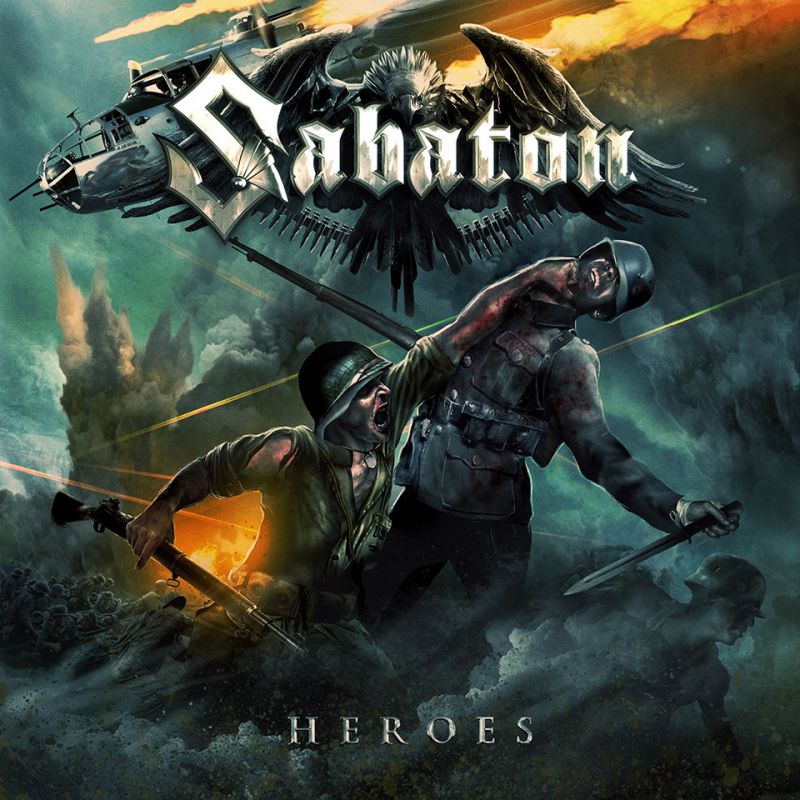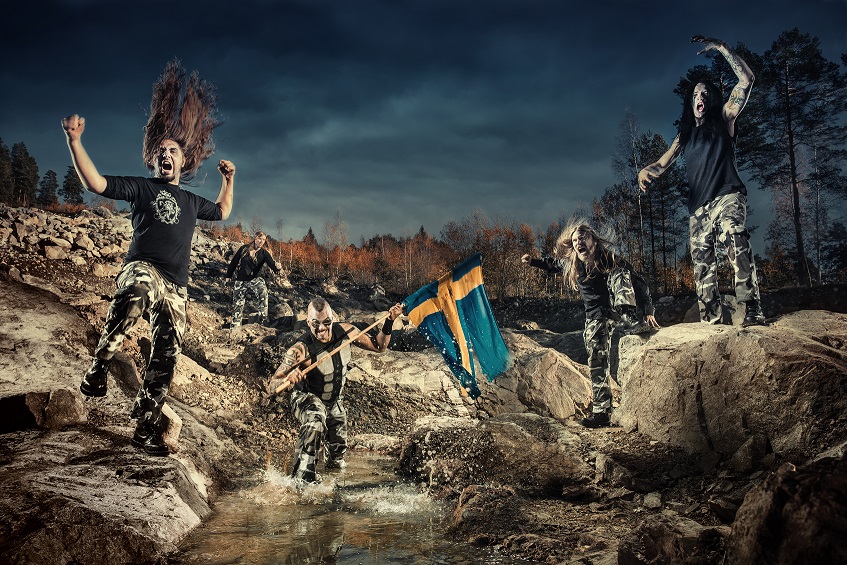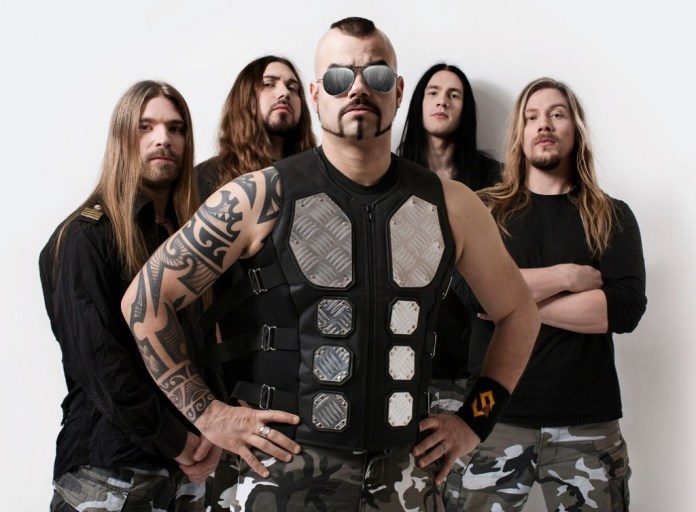Sabaton were an acquired taste for me. While I had enjoyed their previous records, it wasn’t until 2012’s Carolus Rex that I truly started to pay attention to them.
Just as we prepare for the release of Heroes, the band’s newest effort, we met with Joakim Brodén, the founder, singer and (on-and-off) keyboardist of this Swedish ensemble, who was more than happy to tell us more about what’s come.
And don’t forget to check out our review of Heroes!
“We tell the story from the soldier’s point of view”
Metal Blast: Tell me about Heroes, your new album.
Joakim Brodén: It’s a bit of a different concept this time out. We’re still singing about historical events and war, but this time we’re focusing on the personal or human side of things, paying attention to individuals or smaller groups. This is very interesting for me, since I love to tell stories with music. It’s important that we don’t keep doing the same thing over and over again, so I hope this new focus will keep things a little more interesting for us and that people will enjoy it.
MB: When I interviewed Pär (Sundström, bass guitarist) he mentioned that you have a big list of topics to choose from, as a result of asking your fans for ideas for songs. Apparently you got hundreds!
JB: Oh yeah! [laughs] I still don’t know how many we got, but we have a lot. Although many of them point to the same hero or the same battle, we definitely have a huge catalog to choose from.
In both Coat of Arms and Heroes, at least half the stories we present we got from our fans. People send us their ideas to us or talk to us after concerts. The last song on this album, for example, (“Hearts of Iron”) was taken from the book Endgame, by David Strafford;, it’s about the final battle in Berlin, and was given to me by a fan.
[youtube url=”https://www.youtube.com/watch?v=HYWdgBtSM8s”]
MB: Pär mentioned that although he had some interest in history when he was in school, most of the interest appeared after he realized that it was kind of a fun thing to write about. Did this same thing happen to you?
JB: Very much so. Although I think that you need to have a basic level of interest at first, I was not very interested in history when in school. I always wondered “why the fuck should I remember on what date this Swedish king died?!.” I still think that it’s more important to understand and remember the “whats” and the “whys” than the specific dates. The most important thing is what these men did to deserve their place in the history books.
We started to write about war about 10 years ago. Things got more interesting for us through that. We had to do research and check facts, and through that writing process my interest in these topics grew.
MB: I’ve talked with fans that say that they’ve actually grown more interested in history because of the way in which Sabaton presents these stories. I guess you can see that too when these kids come to you and ask you to cover a specific topic.
JB: Many people come to us and say “We have the best heroes! Sing about our country!” One guy was actually pretty cocky and said “There are many war heroes, but this guy is probably one of the top three you’ve ever heard of!”; he was talking about Witold Pilecki, who volunteered to go to Auschwitz for two years to collect evidence. It’s a really crazy story.Of course, it’s well-known in Poland. Since I can’t read Polish at all, we did some research online, but it’s still hard to find details, especially on events that took place in Eastern Europe, due to censoring from the Soviet Union.
MB: And because of that it’s hard for people who don’t speak the native languages to learn about these things.
JB: Every nation wants to promote, their heroes, but it’s much tougher for countries where English is quite a new language. For example, when we told the story of the Swedish empire on Carolus Rex, they were like “Wow! Man, we didn’t know this!”. It was strange to non Swedish people to hear about it.
MB: Pär also told me that your first album was, at first, not allowed in Germany, since you were accused of Nazism.
JB: I don’t know if I should cry or laugh… nowadays I laugh more and more about it, since I’m getting used to it.
The first release had this controversy, but we managed to get the album released in Germany anyway. Then we started singing about the Swedish empire, and while the rest of the world thought it was cool, in Sweden it potentially problematic, because Carolus Rex, Charles The Twelfth, is sometimes used as a figurehead by right-wing extremists (I don’t know why, since he stood for a lot of things that are against what far-right people stand for!). So, now that we’re good in the rest of the, people in Sweden, who’ve never thought about this before, ask us if we’re Nazis. I don’t know how they can even come to this conclusion; we’ve been singing about World War II, literally singing the words “the Reich will rise”, and nobody asked us that in Sweden. Then, we sing about events that happened 300 years ago, and now we’re suddenly Nazis.
It’s stupid; my mother is from the Czech Republic! I would be considered subhuman according to the Nazi ideology. It’s quite interesting though that, in Sweden, when we were travelling to Israel for a show, the media was reporting that we were pro-Israel and anti-Muslim. The same media that called us Nazis!

MB: People seem to have a problem differentiating between when someone is telling a story and someone being political about that story. The fact that you’re talking about the Falklands War or the Six Day War doesn’t mean that you’re taking sides. You’re, quite literally, just trying to present what happened.
JB: Sometimes, of course, we do invite trouble, because we tell the story from the soldier’s point of view. It’s heavy metal! You want to put some action into it! After all, you do the same thing in movies.
What I don’t understand is why, if we make a song about a Nazi soldier, people assume that we have an ideological connection to them, while If Steven Spielberg makes a movie about it nobody’s going to ask him if he’s a Nazi.
MB: I think the problem is that people like to have a very simplistic view of history. If you sing about things from the perspective of a German soldier, there’s sometimes a big difficulty understanding that a lot of them were just kids. They had to face death even though they had nothing to do with politics in the first place.
JB: Many of these young men didn’t know they were invading another country. There was no Youtube or anything like that back then. If you were German, you only knew what Hitler and the others wanted you to know; so if they said “Poland has invaded”, then the young men would of course think “well, fuck the Polish!”. I’m quite sure that 90% of the German soldiers thought they were avenging an attack on Germany.
MB: It’s a little sad that you’re getting used to being labelled as… well, whatever political group a certain person wants to point the finger at.
JB: Yeah. It’s quite interesting though.
MB: It’s incredible what happened in the case of the Battle of Stalingrad. You guys have the song “The Rise of Evil”, about Adolf Hitler. It’s pretty straight forward when it comes to the message. Yet you were still labelled as Nazis and people tried to bar you from performing at the 70th anniversary of the Siege. It’s really incredible; they could at least look at the lyrics.
JB: In a sense I understand. People say no to us for the right reason, and sometimes for the wrong reason. It’s wrong if it happens because people are scared or misinformed, but it has also happened a few times that someone, it could be a sponsor or something like that. who tell us that although they know we’re not Nazis, they simply can’t be telling that to every single stupid motherfuckers who thinks otherwise.
MB: Speaking of promoters… You guys were supposed to play in South America recently, but had to turn around and come back in the middle of a trip. What was the situation there?
JB: I’m both sad and angry about that. I don’t know what the reasons were behind it but, in the end, we lost a weekend where we could have been somewhere else playing. But those who bought a ticket and thought that Sabaton, Orphaned Land and Therion were going to play, they probably won’t get that money back. And the promoters probably won’t get those people back. I don’t know what happened.

MB: I was reading on a news website that they were going to try to reschedule it for later in the month. But I don’t think a lot of bands are going to trust them to go again.
JB: No; It’s not like we only have one show every month. “Okay, yeah you want to change your show, we’re in Sweden and it takes 24 hours travel time to get there. So we’ll clear our schedule for four days to come play.”
Even if this thing could be rescheduled, we couldn’t do it. We’re pretty much booked a year-and-a-half in advance.
MB: It’s a sad situation that promoters in the area keep fucking up. Brazil had a situation like this very recently.
JB: I was really looking forward to it. I had never been to Chile, so myself and a couple of other guys had decided that we were going to stay for a couple of extra days and see the sites.
Now, I’m not saying that this is the case now, but whenever there’s music, there’s always going to be reason to suspect money laundering, for example for drugs. It’s quite simple. Almost anywhere in the world, there larger taxes on products than on concerts, since the state usually sponsors culture and imposes lower taxes.What a promoter could do, if they sell a lot of drugs and need to launder the money, is to start a heavy metal festival. You sell the tickets and let the bands come and play. If there were 3000 people there, you can say that there were actually 12000 and put the money from your drugs in the same bin as the legitimate concert revenue. It’s one of the easiest ways to launder money.
MB: I will keep this information in mind in case it ever becomes useful.
JB: [laughs]
MB: In an interview you mentioned that you nervous about Heroes, since people might judge your sound based on the fact that Rikard (Montelius, ex-guitarist) and Oskar (Sundén, ex-guitarist) aren’t in the band any more…
JB: If people don’t like the album, that’s okay; we’re all different. The worst thing that could happen would be for people to say “Oh no, Sabaton are no good anymore. Chris [Rörland, current guitarist] and Thobbe [Englund, current guitarist] destroyed it.” But, and no disrespect to Rikard and Oskar, Chris and Thobbe came and were not only one step ahead in terms of musicianship and stage presence, but two steps. They were very very convincing live.
MB: At the end of 2013 you lost your drummer Robban Bäck, who was already beign replaced by Snowy Shaw, who is now being replaced by Hannes Van Dahl. Why didn’t you continue with Snowy and how did you get in contact with Hannes to replace him.
JB: Actually Snowy and us had been talking on and off about continuing together. I really liked playing with him and he liked playing with us, but he’s got a solo project that he wants to do. We’ve known Hannes since 2010, and I was actually surprised with his sense of groove; I knew he could play the technical stuff, but I wasn’t so sure on the slower, harder stuff. He was much better than I expected and it was actually Snowy who recommended him.
MB: Speaking of Rikard and Oskar, have you had the chance to listen to any of the Civil War material.
JB: Not everything, only a few tracks. To be honest, I didn’t like the EP at all. Then I was surprised when the album came, since the were a lot better. Patrick, the singer, has a great voice. I played with him a while back.
MB: Do you think it’s too similar to Sabaton?
JB: No I don’t think so. Maybe one or two songs have a little bit of similarity, but that’s it. I’m quite glad they actually found a good singer after being dragged down by a crappy one for so many years. [Laughs]
MB: Well, I’m looking forward to see you guys perform this great album live. Do you have any final messages?
JB: I’m useless at this! 50% of the interviews ask me if I have any final messages and you’d think that after all these years I would have learned to have one but… no, I never do. I guess the final message would be that I’m stupid! [laughs]
MB: [laughs] We’ll let everyone know. Thanks for your time!
JB: Thank you! See you soon!


how can people think they are Nazis if they take a second to just listen to the music they will see the respect Sabaton is showing intheir lyrics. That they will sing a song in the other point of view is in my option good, and to say a Natzi soldier who saved countless lives could also be a good person at heart, but lives in a country corruptedby propaganda and madness I found that very brave to show the not so popular version of events. But with the respect it deservesbecause of the deaths it cost. So thanks Sabaton… Read more »
Sabaton rules! And thank you for the amazing interview xP